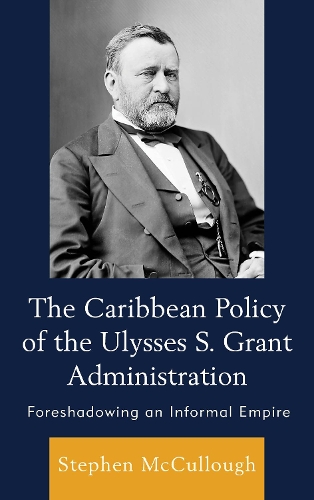
The Caribbean Policy of the Ulysses S. Grant Administration: Foreshadowing an Informal Empire
(Hardback)
Publishing Details
The Caribbean Policy of the Ulysses S. Grant Administration: Foreshadowing an Informal Empire
By (Author) Stephen McCullough Stephen McCullough
Bloomsbury Publishing PLC
Lexington Books
30th November 2017
United States
Classifications
Professional and Scholarly
Non Fiction
973.82
Physical Properties
Hardback
230
Width 160mm, Height 237mm, Spine 19mm
467g
Description
From 1869 to 1877, the United States found itself deeply involved in the Caribbean as Washington sought to replace European influence and colonialism with an informal American empire. The Ulysses S. Grant administration primarily dealt with an uprising in Spanish Cuba known as the Ten Years War that threatened to draw in the United States. The Cuban rebels used the United States as a base of support, causing conflict between Washington and Madrid. Many Americans, including Grant, wanted to replace Spanish rule in Cuba with a U.S. protectorate, but Secretary of State Hamilton Fish opposed American colonial entanglements. President Grant looked to expand U.S. interests in the Caribbean. He looked to acquire colonies to provide naval bases to protect the trade routes to a potential American built and controlled canal in Central America. Fish preferred to expand U.S. commercial interests in the region rather than acquiring colonies. At no time was he prepared to obligate the United States to any long-term commitments. He wanted to end the war in Cuba because it hurt U.S. economic interests. He had no desire to acquire territory, but expected the Caribbean to fall into the U.S. economic sphere. Despite his personal opposition to territorial acquisition in Fish went along with Grants Dominican annexation project because he foresaw it as a chance to end European imperialism and to gain the presidents confidence. The Senates failure to approve the Dominican annexation only hardened his opposition to the creation of an American empire. He rejected Haitian offers of a naval base within that country, and he continually sought an end to the Cuban rebellion, lest it drag in the United States. Though the administrations many peace initiatives failed, it forestalled Congressional intervention and kept the United States neutral in the conflict.
Reviews
If there is any doubt that Ulysses S. Grants presidency influenced the modern American nation, Stephen McCulloughs study of diplomacy during these years lays that matter to rest. McCullough provides insight into the foreign policy of the Grant years and how it foreshadowed the more dramatic century that followed. This important new book is a must read. -- John F. Marszalek, Mississippi State University
Author Bio
Stephen McCullough is associate professor of history at Bryant University Zhuhai.
